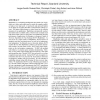Free Online Productivity Tools
i2Speak
i2Symbol
i2OCR
iTex2Img
iWeb2Print
iWeb2Shot
i2Type
iPdf2Split
iPdf2Merge
i2Bopomofo
i2Arabic
i2Style
i2Image
i2PDF
iLatex2Rtf
Sci2ools
132
click to vote
ICDE
2011
IEEE
2011
IEEE
RAFTing MapReduce: Fast recovery on the RAFT
MapReduce is a computing paradigm that has gained a lot of popularity as it allows non-expert users to easily run complex analytical tasks at very large-scale. At such scale, task and node failures are no longer an exception but rather a characteristic of these systems. This makes fault-tolerance a critical issue for the efficient operation of any application. MapReduce automatically reschedules failed tasks to available nodes, which in turn recompute such tasks from scratch. However, this policy can significantly decrease performance of applications. In this paper, we propose a family of Recovery Algorithms for Fast-Tracking (RAFT) MapReduce. As ease-of-use is a major feature of MapReduce, RAFT focuses on simplicity and also non-intrusiveness, in order to be implementation independent. To efficiently recover from task failures, RAFT exploits the fact that MapReduce produces and persists intermediate results at several points in time. RAFT piggy-backs checkpoints on the task progre...
Database | ICDE 2011 | MapReduce | Node Failures | RAFT |
| Added | 21 Aug 2011 |
| Updated | 21 Aug 2011 |
| Type | Journal |
| Year | 2011 |
| Where | ICDE |
| Authors | Jorge-Arnulfo Quiané-Ruiz, Christoph Pinkel, Jörg Schad, Jens Dittrich |
Comments (0)

